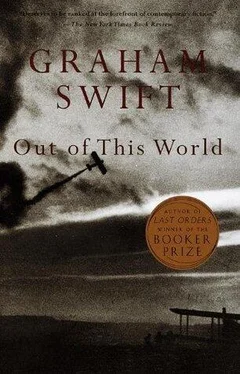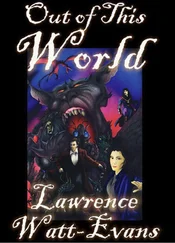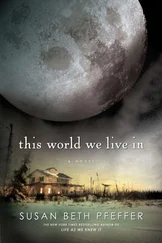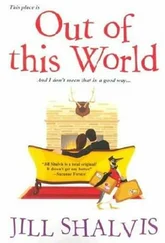Graham Swift - Out of This World
Здесь есть возможность читать онлайн «Graham Swift - Out of This World» весь текст электронной книги совершенно бесплатно (целиком полную версию без сокращений). В некоторых случаях можно слушать аудио, скачать через торрент в формате fb2 и присутствует краткое содержание. Год выпуска: 2012, Издательство: Vintage, Жанр: Современная проза, на английском языке. Описание произведения, (предисловие) а так же отзывы посетителей доступны на портале библиотеки ЛибКат.
- Название:Out of This World
- Автор:
- Издательство:Vintage
- Жанр:
- Год:2012
- ISBN:нет данных
- Рейтинг книги:3 / 5. Голосов: 1
-
Избранное:Добавить в избранное
- Отзывы:
-
Ваша оценка:
- 60
- 1
- 2
- 3
- 4
- 5
Out of This World: краткое содержание, описание и аннотация
Предлагаем к чтению аннотацию, описание, краткое содержание или предисловие (зависит от того, что написал сам автор книги «Out of This World»). Если вы не нашли необходимую информацию о книге — напишите в комментариях, мы постараемся отыскать её.
Out of This World — читать онлайн бесплатно полную книгу (весь текст) целиком
Ниже представлен текст книги, разбитый по страницам. Система сохранения места последней прочитанной страницы, позволяет с удобством читать онлайн бесплатно книгу «Out of This World», без необходимости каждый раз заново искать на чём Вы остановились. Поставьте закладку, и сможете в любой момент перейти на страницу, на которой закончили чтение.
Интервал:
Закладка:
I know this landscape is a lie. Skin deep. Hedgerowed, church-towered, village-strewn England. Rub the map and civilization as we know it disappears. The Bronze Age emerges. And Peter would be the first to point out that these vistas which we like to think of as virgin, naked countryside, the bare bosoms of hills and little pubic clumps of woodland, are all — if it has taken millennia — man-made.
And rub the map again — ever so lightly this time — and a less benign illusion dissolves itself. Half of Wiltshire and Dorset, good lumps of Hampshire and Berkshire are military property. M.O.D. Keep Out. Not countryside any more — camouflage. When I first took up aerial photography I was amazed at the number of mysterious installations, hidden at ground level and unmarked on Ordnance Survey maps, which, quite apart from the more or less advertised air bases and training areas, could be seen from the air. As if, wheeling overhead in a Cessna with a camera, you ran the risk of being taken for a spy.
When I told Peter about these bird’s-eye revelations, he nodded, unsurprised, as if his own experience of archaeological espionage had led to the same discovery. He said, ‘But it’s nothing new. Look at a map of Bronze Age Britain, and what would stand out most prominently? Camps, forts, defence works. What was the great invention of the Bronze Age? The technology of warfare. The sword. That went out only in the last century. Strictly speaking, we’re still living in the Iron Age …’
We forgot the men on the moon. We came in from the terrace. He poured more whisky and he said, ‘And I was the lucky one. The lucky one! I never asked to be head of BMC. You know that, don’t you? You’ve worked it all out, haven’t you? You know that I wished I’d been killed instead of Richard and Edward, don’t you?’
One morning in March, Sophie, which must have been a very noisy and confused morning, in 1918, my father was standing in a trench in northern Picardy, when a grenade landed just a few paces away from him. This was near the town of Albert, ten miles north of the Somme, but at that time it must have seemed like nowhere on earth. The grenade, which landed some five yards from my father, happened also to land less than a foot from his commanding officer, who was lying at the time, unconscious and immobilized from a previous explosion, on the floor of the trench. My father ran to the grenade, picked it up, turned to throw it clear, and, as he did so, it exploded and blew off his arm.
There might be several interpretations of this event. One might be, judging from the criterion of self-preservation, that it was an act of unqualified stupidity. Another, which was the verdict of the army, upheld by eye-witnesses and by the C.O., who, though technically no witness, had every reason to take a highly commendatory view, was that it was an act of unquestionable heroism, meriting nothing less than a Victoria Cross.
I can — just about — imagine a third version, in which my father is less the agent of his own volition than the puppet of conditioned reflexes and received ideas. Remember this is 1918 and the world is only just aware of how it has slid into the twentieth century. He sees the grenade fall and wishes it did not pose him its terrible moral choice. But given that it does, a whole set of notions that have been drummed into his twenty years counters the instinct in his stomach to bolt for cover — duty, training, his brothers’ names on the Roll of Honour, the shame of appearing cowardly, even some half-remembered image, drawn in his case not from Hollywood but perhaps from some ink-blotched school-book (he sees himself as one of the three Horatii or as Ajax bestriding the body of Patroclus), and he finds himself running like an automaton towards the grenade.
But I did not believe this version. My father, who was by this time Captain Beech, had been too long at the front — a miraculously unscathed fifteen months — to be duped in this way. And, besides, since that night at Hyfield, I have known differently.
And I have never told anyone. Even when he died and the press were making hay — Death of a Hero, and variations on that theme — I never breathed a word.
Everyone has their picture of the Great War. Somewhere in the picture is a horrific collision of the antiquated and the modern. A cavalry charge into the teeth of machine-guns. It was not the first or last, if it was the biggest of such collisions, but only the terrible prototype, perhaps, of further collisions that would go on happening, in even more polarized and grotesque forms. As when the latest in military science flattens overnight the fabric of ancient cities or consumes in balls of sticky fire the thatch and daub of a South-east Asian village. Or when the modern photo-explorer sets out to ‘capture on film’ (before he disappears!) the remote tribesman who can still be found living in pre-Bronze Age conditions. (And the tribesman says, No thanks: the camera will steal his reality.)
One picture of the Great War is of two countries, England and France, separated, physically, by a distance so small that the sounds of warfare could carry from one to the other, yet separated, mentally, by a gulf as big as that from the earth to the moon. You think of a traffic, in one direction, of unsuspecting men, and a traffic, in the other, of cruel telegrams. But you forget that sometimes the traffic was reversed and that telegrams now and then brought to the men at the front the news of ordinary, domestic calamity.
He lost his arm on March 30th, 1918. I was born on the 27th. What I never knew was that he knew before . On a March afternoon, about to go up to the line, he hears that his wife has died, giving birth to a son. And the morning after he receives this news, a grenade falls into his path, which the highest principles of valour, at least, demand he pick up.
He said it was a common thing — it happened all the time. The grenades sometimes took ten seconds to explode and they were usually thrown too soon. He said he never deserved to get the V.C. and he would never have got it it he hadn’t lost his arm.
No camera, of course, was present to record exactly what happened. To show, for example, how long he held on to the grenade after picking it up, how far he ran with it (but why should he have done that?) along the trench, or how soon after leaving his hand it exploded. But what no camera could show and what he himself could not tell was whether there had been some instant of teetering, agonized indecision — when the intention was defeated, when he stepped out of the picture and the picture changed, and with a bang, instead of being scattered into nothingness, the whole pattern of his future life clamped around him.
A change of roles. Richard, the eldest and heir-apparent to the family business. Edward, the budding scholar, the family indulgence. Robert, the —?
He said he was that stock, stage figure — the nincompoop youngest son. Except that in those days they really used to exist. He said he never minded being a nincompoop youngest son, that was fine by him. Sandhurst was full of nincompoop youngest sons who had ‘What-shall-we-do-with-him?’ stamped all over them. Some of them got ambitious and became insufferable, and some of them never even knew they were nincompoops.
What she had liked about him was that he did know, and didn’t mind — he was a wise nincompoop. And he would never have guessed that a nincompoop could turn out to be so lucky — or become so serious.
Their short marriage began in April 1917. They honeymooned in Somerset, near Minehead — away from the English Channel. In a country cottage.
He said when he came home on leave he never knew what to tell her. He didn’t know how to tell her. What he used to say was, It was worse for the horses.
Читать дальшеИнтервал:
Закладка:
Похожие книги на «Out of This World»
Представляем Вашему вниманию похожие книги на «Out of This World» списком для выбора. Мы отобрали схожую по названию и смыслу литературу в надежде предоставить читателям больше вариантов отыскать новые, интересные, ещё непрочитанные произведения.
Обсуждение, отзывы о книге «Out of This World» и просто собственные мнения читателей. Оставьте ваши комментарии, напишите, что Вы думаете о произведении, его смысле или главных героях. Укажите что конкретно понравилось, а что нет, и почему Вы так считаете.












